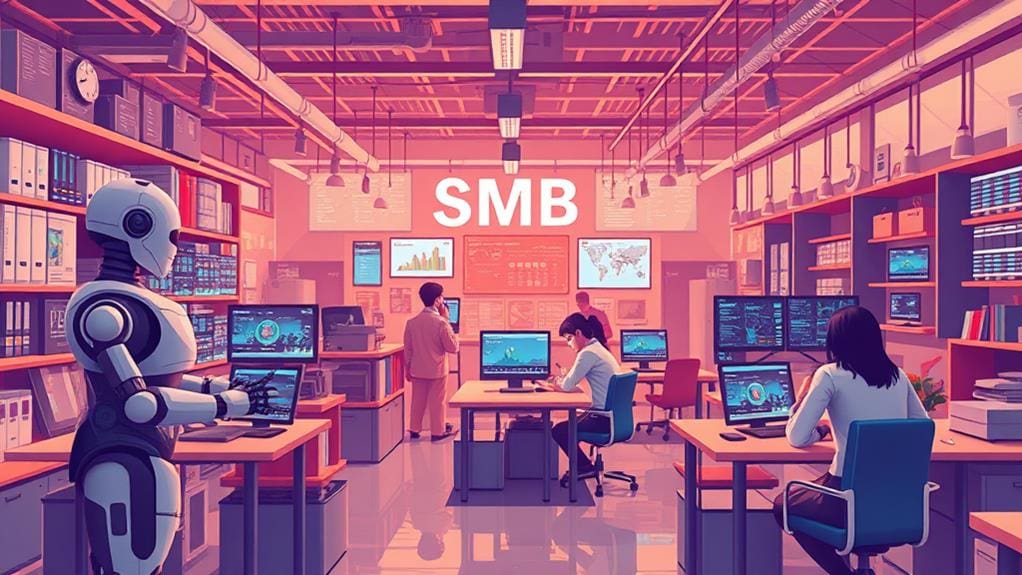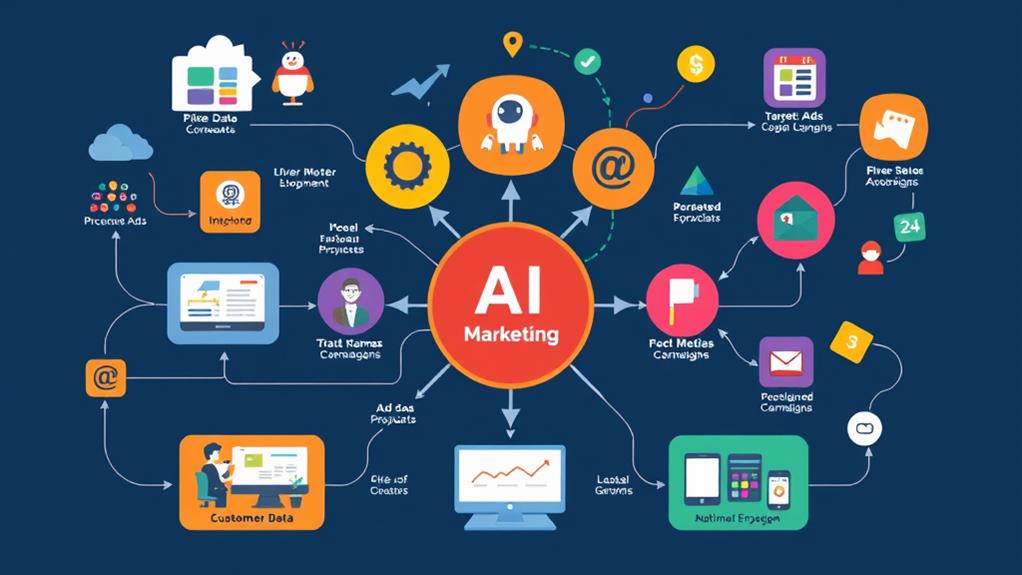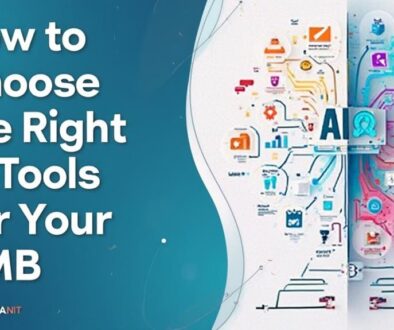The Role of AI in SMB Growth and Expansion
Artificial Intelligence (AI) plays a transformative role in the growth and expansion of small and medium-sized businesses (SMBs). By enhancing customer experiences through personalized interactions and efficient support, AI fosters loyalty and satisfaction. Streamlining operations with automation frees up resources for strategic projects, while data-driven insights inform marketing and operational decisions. AI also optimizes resource allocation and delivers predictive analytics for better planning. Ultimately, embracing AI not only enhances efficiency but also reveals opportunities for sustained growth. There are many strategies and success stories that demonstrate AI's potential for SMBs in today's competitive landscape.
Key Takeaways
- AI enhances operational efficiency by automating routine tasks, allowing SMBs to allocate resources to high-impact projects.
- Data-driven insights from AI support informed decision-making, minimizing risks and optimizing strategy for sustainable growth.
- Personalization through AI improves customer experience, fostering loyalty and engagement in competitive markets.
- Marketing automation powered by AI enhances targeting and streamlines campaigns, boosting customer retention and conversion rates.
- Successful AI integration offers scalable solutions, creating a competitive advantage and enabling rapid growth in SMBs.
Understanding AI Technologies

In the swiftly changing landscape of technology, understanding AI technologies is essential for small and medium-sized businesses (SMBs) seeking to enhance their growth potential. The integration of AI can reveal new efficiencies and elevate decision-making processes.
Machine learning algorithms can analyze large datasets, making sense of big data swiftly to inform strategic planning. Predictive analytics, a cornerstone of AI, enables enterprises to forecast trends and consumer behavior, guiding resource allocation and inventory management.
Natural language processing empowers SMBs to communicate more effectively, leveraging chatbots and virtual assistants to streamline customer interactions. Additionally, computer vision technology opens up opportunities for innovative product development and quality control, enhancing operational quality.
The automation of routine tasks through robotic process automation allows staff to focus on higher-value activities, greatly improving productivity.
Moreover, cloud computing provides a flexible environment for deploying AI solutions, offering scalability and accessibility that traditional infrastructures cannot match.
Yet, as these technologies proliferate, the principles of AI ethics take center stage. SMBs must navigate issues surrounding data privacy and algorithmic bias, ensuring that their use of AI aligns with ethical standards.
Enhancing Customer Experience
Artificial Intelligence is revolutionizing customer experience for small and medium-sized businesses by enabling personalized interactions that cater to individual preferences.
This technology not only enhances engagement but also streamlines support services, allowing companies to respond swiftly and effectively to customer needs.
As a result, SMBs can build stronger relationships and foster loyalty in a competitive landscape.
Personalized Interactions With AI
Embracing personalized interactions with AI offers small and medium-sized businesses (SMBs) a transformative opportunity to enhance customer experience. By leveraging advanced technologies, SMBs can create tailored communication strategies that resonate with individual customers, fostering loyalty and promoting long-term relationships.
Here are three key strategies for utilizing AI in personalized interactions:
- Customer Segmentation: Employ AI-driven tools to analyze customer data, allowing for precise segmentation based on preferences and behaviors. This enables targeted marketing efforts and enhances customer relevance.
- Content Personalization: Utilize predictive analytics and behavioral insights to craft personalized content that addresses specific customer needs and interests. This can substantially improve user experience and engagement.
- AI Chatbots and Feedback Loops: Implement AI chatbots to provide instant responses and gather feedback. These feedback loops can help refine engagement strategies and guarantee that customer interactions remain relevant and meaningful.
Streamlined Support Services
How can SMBs effectively enhance customer experience through support services? By integrating advanced technologies like AI chatbots, virtual assistants, and predictive analytics, small and medium businesses can transform their support services into powerful tools for customer engagement.
These automated solutions not only provide instant responses to customer inquiries but also gather valuable customer feedback to refine service offerings.
Service automation streamlines processes, guaranteeing that customer interactions are efficient and timely. This enhanced operational efficiency allows businesses to address issues proactively, elevating the overall customer experience. For instance, AI integration allows for the analysis of customer data, helping businesses predict service needs and trends, thereby enabling a tailored approach to support.
Moreover, support scalability is essential for SMBs aiming for growth. Implementing these AI-driven solutions guarantees that as demand increases, service quality remains consistent.
By embracing this technology, businesses not only reduce response times but also empower their teams to focus on more complex issues requiring a human touch.
In a competitive landscape, leveraging AI for streamlined support services equips SMBs with the tools needed to foster loyalty and satisfaction among customers, positioning them for sustainable growth and expansion.
Streamlining Operations

In today's competitive landscape, streamlining operations has become a critical priority for small and medium-sized businesses (SMBs) looking to enhance efficiency and profitability. By leveraging artificial intelligence (AI) technologies, SMBs can refine their processes and allocate resources more effectively, ensuring they remain agile and responsive to market demands.
AI-driven tools facilitate process refinement in several impactful ways:
- Automation of Routine Tasks: By automating repetitive tasks, businesses can free up valuable human resources to focus on high-impact projects that drive growth.
- Enhanced Resource Allocation: AI analyzes workload patterns efficiently, allowing SMBs to allocate team members and financial resources where they are needed most, reducing wastage and improving output.
- Improved Supply Chain Management: AI can predict trends and manage inventory levels, ensuring that businesses maintain ideal stock levels while minimizing excess and reducing costs.
The implementation of these AI solutions not only streamlines operations but also empowers SMBs to focus on strategic initiatives.
By addressing inefficiencies and enhancing communication across various departments, businesses can create a more cohesive work environment.
Ultimately, embracing AI for streamlining operations isn't merely a trend; it is a strategic necessity.
Companies that prioritize process refinement and intelligent resource allocation are better positioned to enjoy sustainable growth, leaving them the freedom to innovate and expand while maintaining a competitive edge in their respective markets.
Data-Driven Decision Making
Data-driven decision-making has emerged as a pivotal approach for small and medium-sized businesses (SMBs) aiming to thrive in an increasingly complex market landscape. By leveraging data analytics, SMBs can harness predictive analytics to anticipate customer needs and behaviors, effectively positioning themselves in a competitive environment. This strategic utilization of business intelligence facilitates more informed choices that propel growth while minimizing risks.
Essentially, data visualization transforms raw data into comprehensible insights, allowing decision-makers to quickly grasp performance metrics and discern market trends. Utilizing interactive dashboards, SMBs can monitor key indicators in real-time, enabling immediate adjustments to strategies. This agility is vital for maintaining operational efficiency amidst shifting market dynamics.
Moreover, effective risk assessment powered by data systems allows businesses to identify potential challenges before they escalate, ensuring that hurdles do not derail growth initiatives. By integrating advanced analytics in revenue forecasting, SMBs can approach future planning with greater confidence, optimizing resource allocation and maximizing profitability.
Marketing Automation Strategies

Building on the foundation of data-driven decision-making, marketing automation strategies have become integral for SMBs seeking to enhance their outreach and engagement efforts.
By utilizing AI-driven solutions within marketing, small to medium businesses can refine their approaches, streamline processes, and maximize their resources. This shift not only saves time but also empowers SMBs to focus on their core competencies while efficiently driving growth.
Here are three key marketing automation strategies that can markedly elevate an SMB's marketing game:
- Content Generation: Leverage AI tools to produce high-quality, relevant content tailored to your audience's interests. Automated content creation not only reduces labor costs but also guarantees consistency in branding and messaging across all platforms.
- Lead Scoring: Implement sophisticated lead scoring systems powered by AI to prioritize prospects based on their behaviors and engagement levels. This strategy enables marketing teams to allocate their resources effectively and focus efforts on leads most likely to convert, thereby increasing sales efficiency.
- Multi-Channel Campaign Management: Centralize your marketing efforts by automating campaigns across various channels such as email, social media, and website marketing. Automation guarantees timely and consistent communication with your audience, enhancing engagement and fostering lasting relationships.
As SMBs embrace these automation strategies, they gain the freedom to innovate and grow, guaranteeing their marketing efforts are not just efficient but also impactful.
In a world where agility is paramount, marketing automation stands out as a game-changer.
Case Studies of Success
Numerous small to medium-sized businesses (SMBs) have experienced transformative growth by effectively implementing AI-driven marketing automation strategies. Case studies reveal how strategic AI adoption has led to measurable success metrics across various industries.
For instance, a local e-commerce startup harnessed AI to streamline its inventory management, greatly reducing operational costs while enhancing customer satisfaction through personalized recommendations. This technology integration not only increased sales but also provided a competitive advantage by enabling rapid scalability.
In the health and wellness industry, a subspecialty clinic utilized AI tools for appointment scheduling and patient follow-up, improving patient engagement and retention. Through case analysis, it was evident that the clinic experienced a 30% increase in patient bookings and a 25% enhancement in follow-up adherence rates, showcasing the tangible impact of innovative growth strategies.
Another notable example is in the hospitality sector, where a small hotel used AI-powered chatbots to handle customer inquiries and reservations. This application not only freed up staff resources for more personalized interactions but also improved response times, ultimately increasing bookings by 40%.
These case studies illustrate the power of AI in releasing innovation insights that drive sustained growth. By adopting AI technologies, SMBs not only improve operational efficiencies but also enhance customer experiences, ultimately fostering lasting brand loyalty.
The strategic implementation of AI represents a considerable step for SMBs seeking to thrive and expand in today's competitive market landscape.
How Do AI Tools Accelerate SMB Growth and Expansion?
AI tools revolutionize small and medium-sized business operations by streamlining processes, enhancing customer engagement, and driving smarter decision-making. By utilizing the top 10 ai tools for smbs, businesses can automate repetitive tasks, gain valuable insights from data, and optimize marketing strategies, all of which contribute to accelerated growth and seamless expansion opportunities.
Frequently Asked Questions
How Can SMBS Access Affordable AI Solutions?
Small to medium-sized businesses (SMBs) can access affordable AI solutions through several strategic avenues.
Utilizing cloud-based solutions allows for scalability without significant upfront investment.
Furthermore, open source tools present cost-effective opportunities to integrate AI capabilities while fostering innovation.
Establishing AI partnerships can also enhance resource sharing and expertise, leading to more efficient deployment of AI strategies.
Collectively, these approaches empower SMBs to leverage AI without overwhelming financial burdens.
What Skills Are Needed to Implement AI Technologies?
In the world of technology, having the right skills is essential to avoiding pitfalls. Implementing AI technologies requires technical expertise in programming and systems architecture, paired with robust data analysis capabilities to extract meaningful insights.
Additionally, understanding integration strategies is critical for seamless deployment across platforms.
Finally, ethical considerations must be prioritized to safeguard data and guarantee compliance.
Together, these skills empower organizations to harness AI's potential effectively and responsibly.
Are There Any Downsides to Using AI in Smbs?
While AI offers numerous benefits, it is essential to acknowledge its limitations and the implementation challenges that small and medium-sized businesses (SMBs) may face.
Misalignment with specific business needs can lead to ineffective applications, and reliance on AI may diminish human creativity and decision-making.
Additionally, the initial investment in AI technology and ongoing maintenance can strain resources.
Therefore, a strategic approach is necessary to harness AI effectively while mitigating potential drawbacks.
How Do Privacy Concerns Affect AI Adoption in Small Businesses?
Approximately 60% of small businesses express concerns about data security when considering AI adoption.
This trepidation stems from the potential risks associated with handling sensitive customer information. Ensuring robust data protection measures is essential not only for compliance but also for maintaining customer trust.
Small businesses must navigate the delicate balance between leveraging AI advancements and safeguarding personal data, thereby fostering an environment where innovation and consumer confidence coexist harmoniously.
What Role Does AI Play in Employee Training and Development?
AI greatly enhances employee training and development by facilitating personalized learning experiences tailored to individual needs.
Utilizing performance analytics, organizations can identify skill gaps and optimize training content, resulting in more effective learning outcomes.
In addition, AI-driven platforms offer real-time feedback, empowering employees to take ownership of their growth.
This strategic approach not only improves workforce competency but also fosters a culture of continuous improvement, ultimately benefiting the organization as a whole.
Conclusion
In the constantly changing landscape of small and medium-sized businesses, the integration of AI technologies heralds a profound transformation. With each strategic application—from enhancing customer experience to streamlining operations—SMBs stand at the precipice of unprecedented growth. As data-driven insights illuminate paths previously obscured, marketing automation weaves a tapestry of opportunity. What remains to be seen is how these entities will harness this potent force. The future, fortified by AI, beckons tantalizingly, filled with promise and potential.




